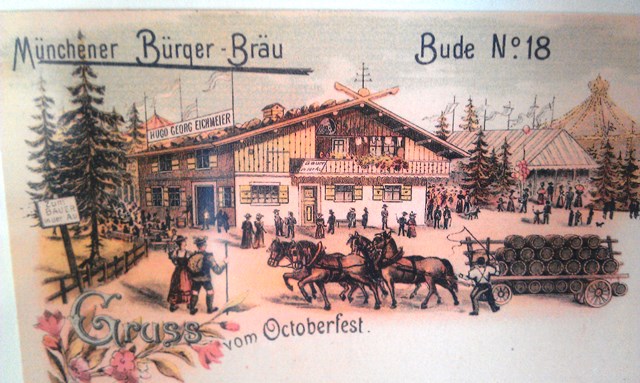
early Oktoberfest tent 1
OKTOBERFEST — AT LEAST ONCE
The 2017 Oktoberfest has wrapped up, and you’ll have to wait until next September 27 to enter the next tent. This year 6.2 million visitors guzzled 7.5 million liters of beer. Every serious beer drinker we know wishes she could have been in Munich recently for Oktoberfest. Except for those who have, in fact, attended the event. I don’t know anyone who centers his life around making a yearly pilgrimage. It is in many ways the biggest, baddest, most spectacular beer event in the world, but it’s also a touristy, loud, pricy extravagance.
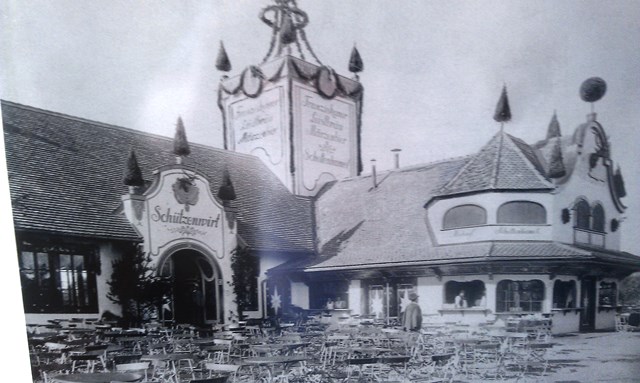
early Oktoberfest tent 2
There’s a parallel in the world of baseball. Ellie and I usually attend a few Washington Nationals game every year and we’ve been to several playoff games. On our last visit, a nearly hour long wait for a slice of pizza and a craft beer reminded me why we only made it to one game this year and we will be watching the postseason on HDTV. We go to quite a few minor league games, however; shorter lines and closer seats give us a fine baseball experience with few hassles and less expense.
The “minor league” experience in the world of Oktoberfest are the myriad of local festivals throughout Bavaria during spring, summer, and most of the fall. A bit of digging on line can produce a wealth of options. These fests are smaller, though the biggest provide more food, drink, rides and entertainment than a person can consume in a day. The largest, in Stuttgart, is substantially larger in area than the Munich fest that ends a few days earlier.
This season, however, belongs to Oktoberfest. If it’s still on your bucket list, keep it there. It is something to experience once. But do your homework. Even in the 90s, walking into a tent was a pretty easy thing to do. We visited every major tent in 1989. Today some planning and realistic expectations can still make it a once-in-a-lifetime treat. Here are a few tips to enjoying it:
- Plan on more than one day. There are 14 distinctive massive tents – the smallest holds 5,000 people. Visiting only one is like seeing one movie and thinking you’re a film critic. There are 21 smaller tents, some with exceptional food choices, that are quieter and sometimes easier to get into. Even the smallest have some sort of music.
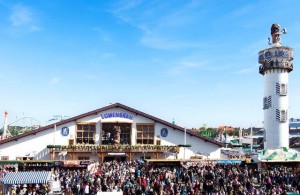
It’s worth the effort – Lowenbraeuzelt in full swing. (*)
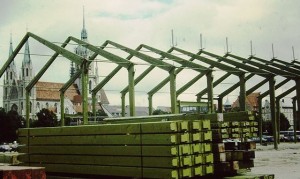
St. Paul’s Church in the background had to be rebuilt after WWII, but the massive Oktoberfest tents are rebuilt every year.
2. Get reservations for the tents if you can. You would think the 100,000 seats, give or take, would provide plenty of room, but remember there are up to six million visitors vying for them. But there’s a catch: reservations are only given to groups of ten. The reservation is free, but you have to pay for 20 liters of beer and 10 chickens in advance. Reserve by contacting the individual tents by fax or letter in the late winter or spring. You can show up with lest than 10 people; the tent owner has already gotten your money for food and drink. Waiters will usually ask to seat people at any vacancies you provide, so you’re usually not buying extra elbow room. Often, left-over vouchers can be used at the tent owner’s restaurant in town for a while even after the fest is over. Next time we go, the plan is to reserve a table and find six or eight “new best friends” at our hotel to join us. Of course these people wouldn’t allow us to shoulder all the expense — they’re our best friends, after all. We’re pretty sure that this would avoid the prohibition on “resale” of reservations: they have metal detectors, not lie detectors at the gate.
3. If you go early enough, especially on a weekday, you have a chance of getting seats without a reservation. Each tent is required to keep some seats reservation-free, but they don’t keep many and they go very early. A group of two has a much better chance than a larger group. Singles, especially single women, can sometimes get into tents that are “full.” On weekends tents sometimes close as early as 11:00AM when they reach capacity and most tents are sold out most of the day. If it rains, the tents fill quickly and stay filled.
4. If your hotel has a concierge – and all the big ones do—he might have secured a table or two for hotel guests. You’ll still have to may the minimum consumption fee, but you’ll have a seat.
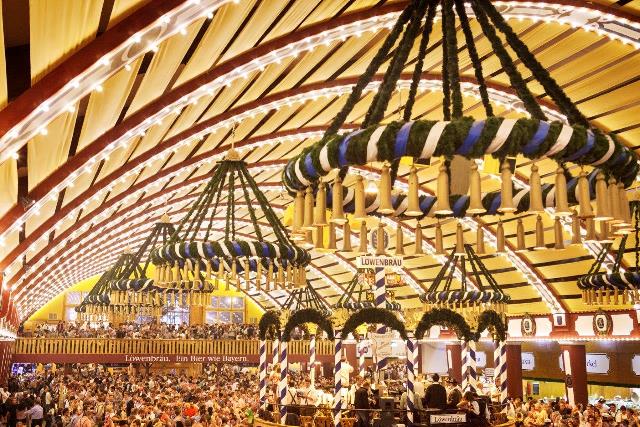
From the inside, it’s hard to believe the tents are temporary (*)
5. If you hit a heat wave, stop grousing and be thankful that you’ll be able to find seats much more easily. The beer will still be cold and fresh. The sunnier the weather the more people will use the gardens outside the tents and the greater likelihood that you’ll be able to snag seats inside. The gardens, by the way, are never reserved, often have room, and the music inside is piped outside.
6. Make room reservations early. Airbnb saves you from having to book a hotel in a city 100 km away or pay $400 to $600 or more for an ordinary hotel room. Especially towards the end, spaces open up both inside and outside the festival. We found dozens of rooms on Airb&b’s website for about $100 a night for the last two days of the fest. If you really want a hotel, Nuremburg is barely over an hour away by train and Augsburg is even closer. Both cities have lots of hotels. Suburban villages 30 to 40 minutes outside of town have guest houses and the area around the airport is awash with hotels. The Freising Marriott, for example had rooms open for the last two days at about $250 a night – not much more than you’d pay during other times of the year. The fest is easily accessible by UBahn from the main station.
7. The 10:30 last call in the beer tents can be shocking for residents of anywhere but Bavaria. The wine tent serves beer until just after midnight, but…it’s a wine tent. But rejoice – the after party rocks the Park Café, a beer garden that’s a ten minute walk from the main station (or one stop on bus 100.) The Park is in the old botanical garden and is worth a visit on its own. Alternatively, Lowenbrau turns the entire top floor of their massive beer hall into a “Wiesnzelt“ am Stiglmaierplatz” designed to authentically replicate the experience of being in their tent in the wiesn. The party also spills over into many of the city’s late night drinking spots.
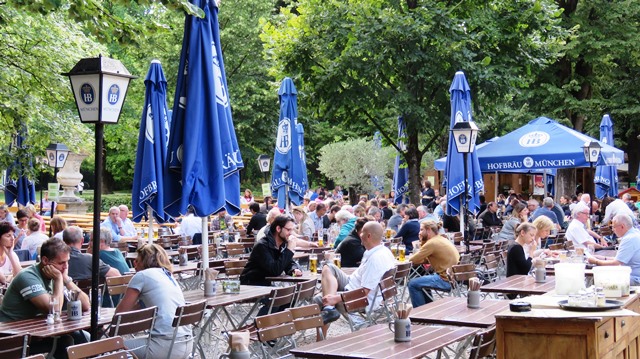
After the fest closes, those in the know continue the carousing at the Park Café’s Biergarten that stays open until 1 AM
8. Want to dress for the occasion? Stalls in the fest will sell you almost any kind of clothing but you can save a bucket of Euros with a visit to Resale – a used trachten store just off the Marianplatz in the direction of St. Peter’s cathedral.
9. You don’t need much German, but here’s the minimum:
- Bitte (or often better, Bitte Schoen) = Please (the “Schoen” intensifies the politeness. Remember “pretty please” when you were 8?)
- Danke (or better Danke Schoen) = thank you (very much)
- Grüß Gott = literally God’s Greeting or Blessing, but in Bavaria, it’s “Hello”. Convenient because it’s OK at any time of the day or night.
- Noch Ein Bier = One more beer.
10. A few other random things to know:
- Most backpacks are banned. Expect security to be very tight, but security lines have been tolerable.
- It’s fine to bring the kids – there are more rides than in Disneyland—but the little ones have to clear the beer tents by 8PM when things can start to get rowdy.
- The beer taps flow no later than 10:30, though a couple of wine tents stay open later.
- Smoking is now banned inside the tents (a mercy, believe us).
- If you’re in a men’s room and see a chest-high urinal with handles on the sides, it’s not for basketball players. The fair used to have walls with porthole-like cutouts to use as a vomitorium. Hooray for the progress of man.
- Next year’s dates (2018) are September 22 to October 7.
[Post 0037 20171002]
(*These Oktoberfest photos courtesy of Steffi Spendler, Löwenbräuzelt; Other photos © Robert Tupper, CulturAlePress, or public domain)
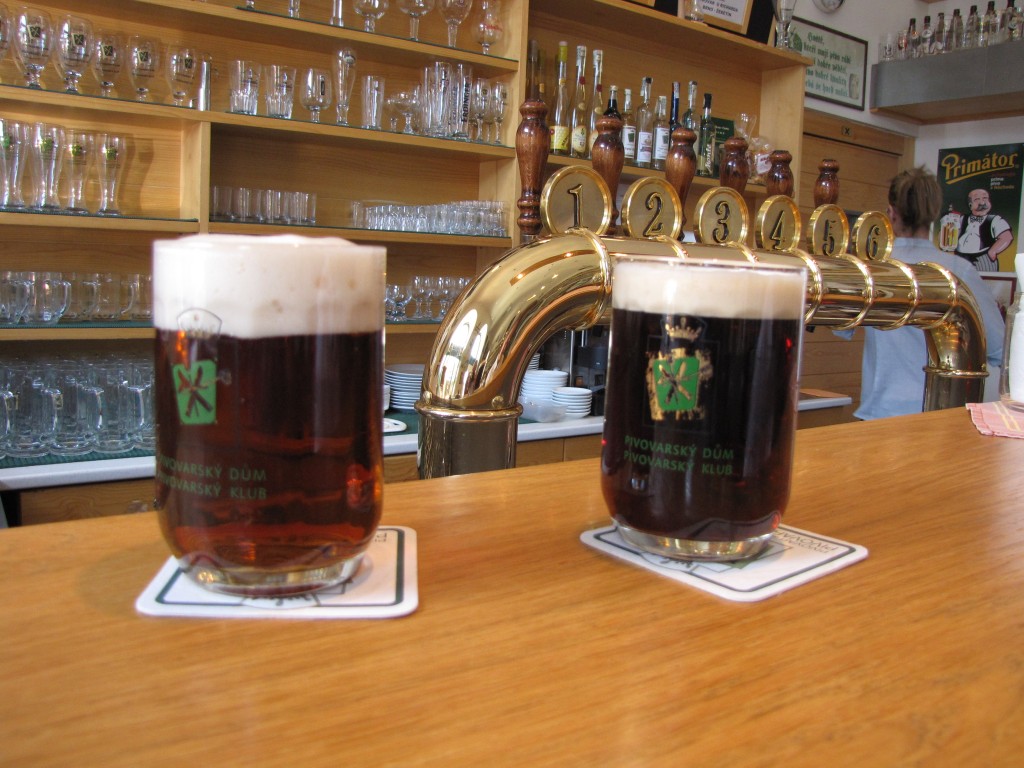
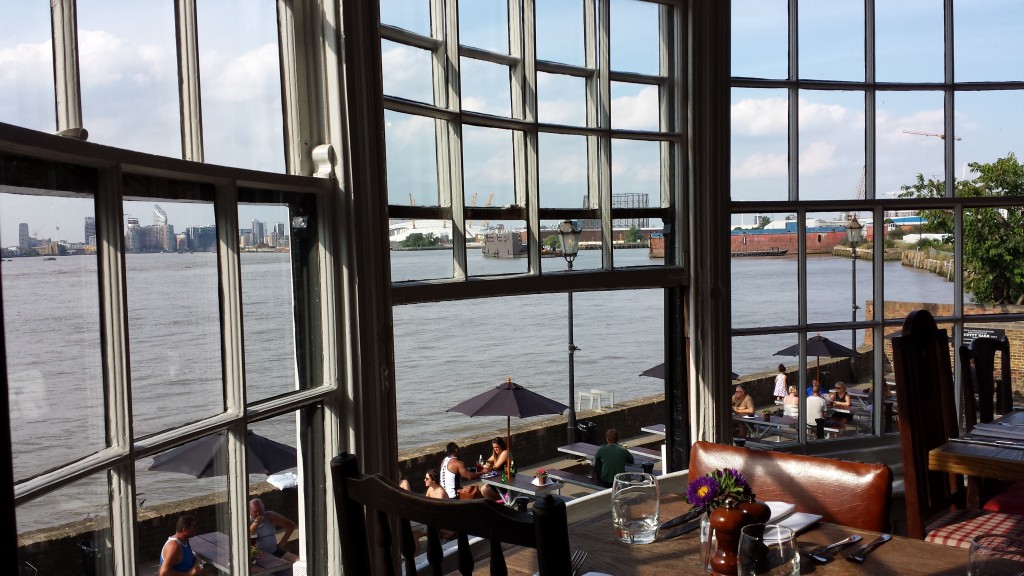
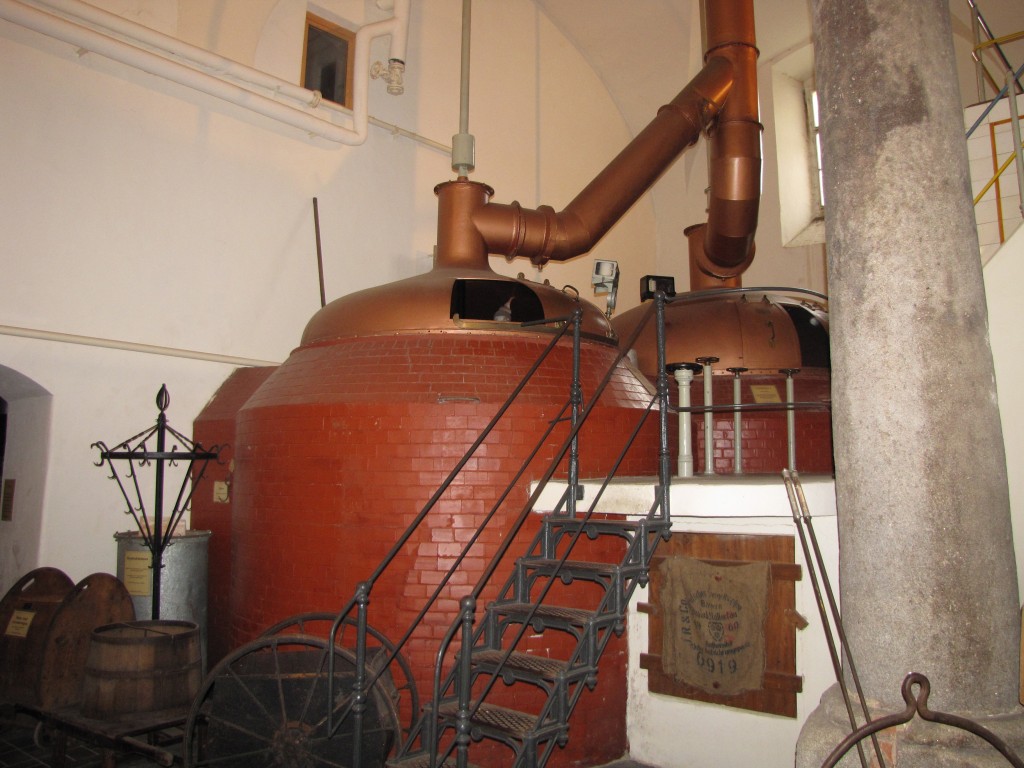
Leave a Reply